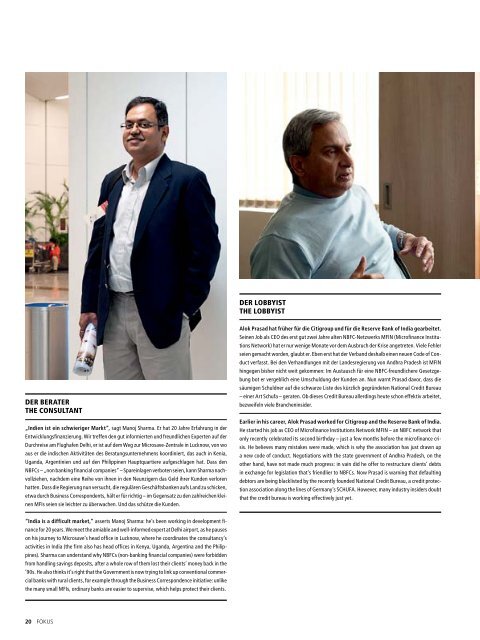FINANCE FOR ALL ? - Frankfurt School of Finance & Management
FINANCE FOR ALL ? - Frankfurt School of Finance & Management
FINANCE FOR ALL ? - Frankfurt School of Finance & Management
Sie wollen auch ein ePaper? Erhöhen Sie die Reichweite Ihrer Titel.
YUMPU macht aus Druck-PDFs automatisch weboptimierte ePaper, die Google liebt.
DER LOBBYIST<br />
the LOBBYIST<br />
DER BERATER<br />
THE CONSULTANT<br />
„Indien ist ein schwieriger Markt“, sagt Manoj Sharma. Er hat 20 Jahre Erfahrung in der<br />
Entwicklungsfinanzierung. Wir treffen den gut informierten und freundlichen Experten auf der<br />
Durchreise am Flughafen Delhi, er ist auf dem Weg zur Microsave-Zentrale in Lucknow, von wo<br />
aus er die indischen Aktivitäten des Beratungsunternehmens koordiniert, das auch in Kenia,<br />
Uganda, Argentinien und auf den Philippinen Hauptquartiere aufgeschlagen hat. Dass den<br />
NBFCs – „non banking financial companies“ – Spareinlagen verboten seien, kann Sharma nachvollziehen,<br />
nachdem eine Reihe von ihnen in den Neunzigern das Geld ihrer Kunden verloren<br />
hatten. Dass die Regierung nun versucht, die regulären Geschäftsbanken aufs Land zu schicken,<br />
etwa durch Business Correspondents, hält er für richtig – im Gegensatz zu den zahlreichen kleinen<br />
MFIs seien sie leichter zu überwachen. Und das schütze die Kunden.<br />
Alok Prasad hat früher für die Citigroup und für die Reserve Bank <strong>of</strong> India gearbeitet.<br />
Seinen Job als CEO des erst gut zwei Jahre alten NBFC-Netzwerks MFIN (Micr<strong>of</strong>inance Institutions<br />
Network) hat er nur wenige Monate vor dem Ausbruch der Krise angetreten. Viele Fehler<br />
seien gemacht worden, glaubt er. Eben erst hat der Verband deshalb einen neuen Code <strong>of</strong> Conduct<br />
verfasst. Bei den Verhandlungen mit der Landesregierung von Andhra Pradesh ist MFIN<br />
hingegen bisher nicht weit gekommen: Im Austausch für eine NBFC-freundlichere Gesetzgebung<br />
bot er vergeblich eine Umschuldung der Kunden an. Nun warnt Prasad davor, dass die<br />
säumigen Schuldner auf die schwarze Liste des kürzlich gegründeten National Credit Bureau<br />
– einer Art Schufa – geraten. Ob dieses Credit Bureau allerdings heute schon effektiv arbeitet,<br />
bezweifeln viele Brancheninsider.<br />
Earlier in his career, Alok Prasad worked for Citigroup and the Reserve Bank <strong>of</strong> India.<br />
He started his job as CEO <strong>of</strong> Micr<strong>of</strong>inance Institutions Network MFIN – an NBFC network that<br />
only recently celebrated its second birthday – just a few months before the micr<strong>of</strong>inance crisis.<br />
He believes many mistakes were made, which is why the association has just drawn up<br />
a new code <strong>of</strong> conduct. Negotiations with the state government <strong>of</strong> Andhra Pradesh, on the<br />
other hand, have not made much progress: in vain did he <strong>of</strong>fer to restructure clients’ debts<br />
in exchange for legislation that’s friendlier to NBFCs. Now Prasad is warning that defaulting<br />
debtors are being blacklisted by the recently founded National Credit Bureau, a credit protection<br />
association along the lines <strong>of</strong> Germany’s SCHUFA. However, many industry insiders doubt<br />
that the credit bureau is working effectively just yet.<br />
“India is a difficult market,” asserts Manoj Sharma: he’s been working in development finance<br />
for 20 years. We meet the amiable and well-informed expert at Delhi airport, as he pauses<br />
on his journey to Microsave’s head <strong>of</strong>fice in Lucknow, where he coordinates the consultancy’s<br />
activities in India (the firm also has head <strong>of</strong>fices in Kenya, Uganda, Argentina and the Philippines).<br />
Sharma can understand why NBFCs (non-banking financial companies) were forbidden<br />
from handling savings deposits, after a whole row <strong>of</strong> them lost their clients’ money back in the<br />
’90s. He also thinks it’s right that the Government is now trying to link up conventional commercial<br />
banks with rural clients, for example through the Business Correspondence initiative: unlike<br />
the many small MFIs, ordinary banks are easier to supervise, which helps protect their clients.<br />
20 FOKUS


